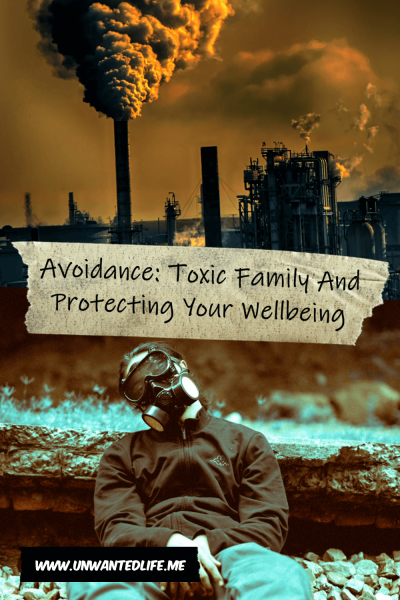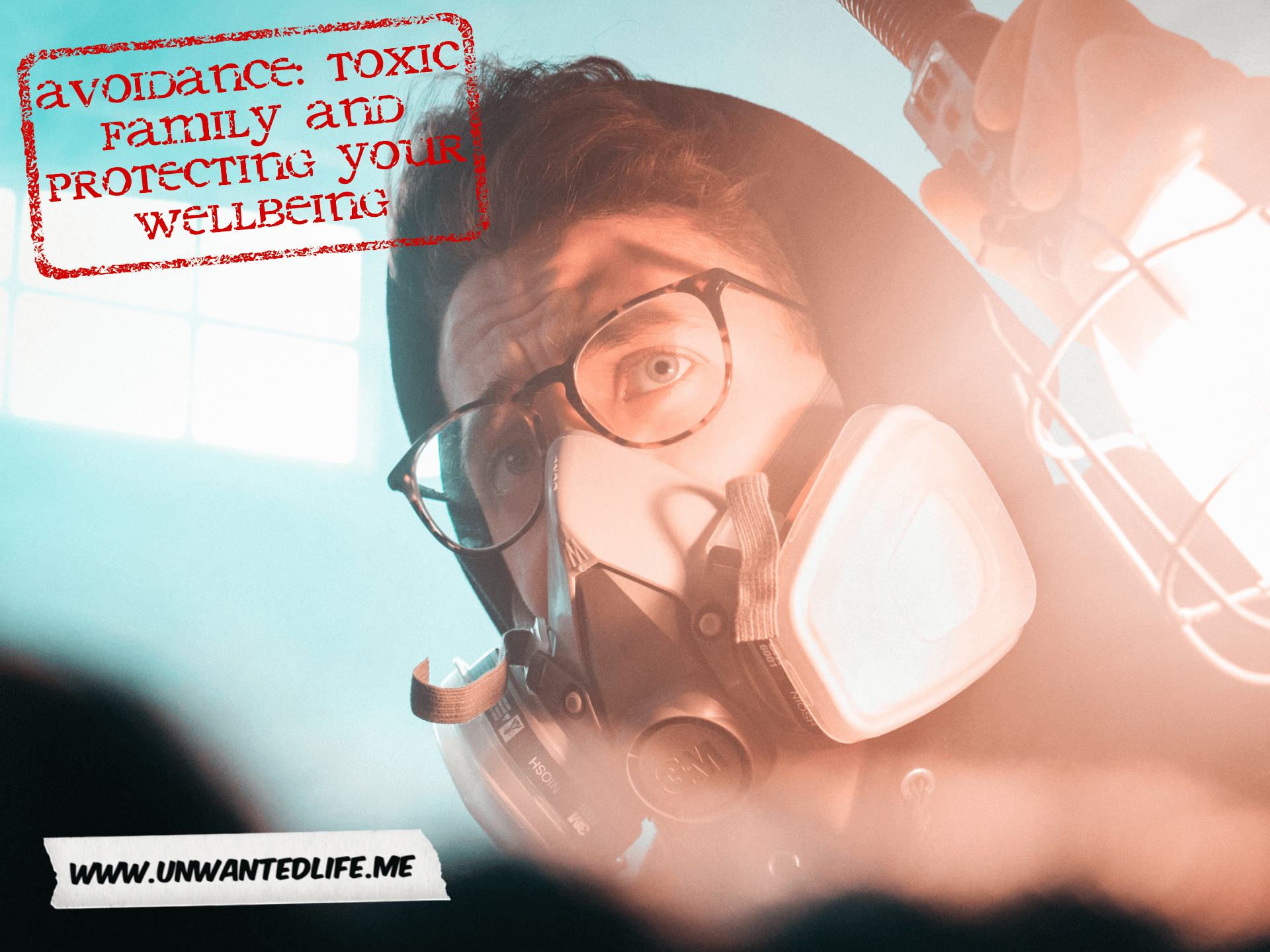I try to avoid interacting with my mum as much as possible because she’s not good for my mental health. Thus, I engage in parental avoidance. Although avoiding her to save me, the anguish of dealing with her isn’t the only reason I do it. I don’t have any real attachment to my mum either, just like I have no real attachment to anyone I’ve ever met.
Although I do get a fleeting feeling of being overly attached in the first couple of months of a new relationship, then that goes and leaves nothing behind. The legacy of my childhood and the borderline personality disorder that came with it.
Toxic Family Members
All families can fight, argue, and fall out with each other from time to time, but to be considered toxic goes a step further than that. Toxic families often have issues with various forms of abuse, manipulation, and discrimination, with toxic behaviours being a chronic issue.
One of the common toxic traits you’ll see portrayed on TV shows and films is unrealistic expectations. For example, treating a child like they’re an adult and expecting them to behave and work like an adult is often seen as a child fulfilling the role of an absent parent.
There’s also the type of family dysfunction where the parent wants the child to live the life they did or weren’t able to achieve. This kind of toxicity denies the child their sense of self and right to their own identity so that the parent can live the life they want vicariously. A parent should want to help a child find their own path rather than force them down a road of the parent(s) choosing.
If your needs aren’t being met or respected by your family, then you may have a toxic family. If they disregard your boundaries and your repeated attempts to protect yourself by creating boundaries, then you may find yourself in a situation where you need to consider which is more important: your family or your mental wellbeing. Sometimes avoidance is the best option.
Then there’s classic domestic abuse, with the abuse taking the form of psychological, physical, sexual, financial, emotional, and cultural/identity. It’s often hard to escape these kinds of abuse from your family members.
There are far more ways a family can become toxic, but in short, any kind of chronic dysfunction within the family will create a toxic environment that will erode your mental wellbeing.
The Avoidance Of My Toxic Mum
Luckily, my mum and I don’t live anywhere near each other, so I don’t have to see her that often. This makes engaging in parental avoidance a lot easier. But my mum will call me from time to time, whereas I’ll avoid calling her unless I absolutely have to.
If you’ve read Childhood Neglect: An Awkward Phone Call With My Mum, or my previous article, Let The Battle Begin: My Weekend With My Mum, you’ll already have a bit of an idea as to why I try to avoid interacting with my mum.
I seriously hate talking to my mum. You can guarantee that she’ll make me feel like a waste of space before the phone call ends, which is why I rarely call her. Every conversational encounter with my mum is depressing, frustrating, and annoying. I can go months, even years, without contacting her. I’ve never missed my mum. I’ve never felt homesick, and I’ve never felt connected to her. Because of this, I’ve spent more Xmas alone than I’ve spent with my mum since turning 18. I prefer avoidance and being alone to spending time with my mum.
But this wasn’t the only series of annoyingly difficult phone conversations. Almost every conversation comes back to me “working” and how I won’t be depressed if I work. Even though that’s never helped before with my mental health. It also ignores the scale of my mental health problems and completely ignores the life-changing problems my physical health problems cause me.

When she’s not belittling my mental health, telling me to “get over it” or “that’s all in the past, you need to forget it” – I’d love to be able to forget it, but that’s not how it works, unfortunately. My mum will also forget or completely ignore the difficulties of my physical health issues, boiling all my problems down to “everyone feels like that when they get up off the sofa too fast” whilst telling me I need to “exercise” more.
It doesn’t matter how many times I remind her of just how bad my physical health is for me, she always boils it down to this ridiculous idea that it’s on par with getting up off the sofa too fast. It doesn’t matter that I exist in a near-permanent state that closely matches a vertigo attack.
This means I constantly feel nauseous, I’m always dizzy, my balance is always slightly off, my eyes feel weird, and I have foggy thinking that can become quite a cognitive impairment if my other symptoms get too bad or I become hungry. All of this can be made worse by movement. I can even become travel sick by walking, which is seriously annoying.
But that’s on a day-to-day basis. There are other times when my muscles become so weak that I can’t move, I can black out, and I can lose control of my bladder and bowel. I’m lucky that I’m fully aware of when this is coming on, giving me enough time to slump down on a toilet. I’m also lucky that this only happens when I try to exercise (at least for now anyway), normally within the first 2-5 minutes of doing my warm-up. It also only lasts about 40 minutes, although I’ll feel like death for a few hours afterwards.
That’s not even the end of the problems. My physical health problems and my anxiety disorders all work together to make each other far worse, causing a hideous cascading effect. But none of that matters to my mum, and she reminds me of that. Every. Single. Time. We. Talk.
My mum’s one of my biggest triggers for crashing my mental health, so the way she trivialises my mental and physical health problems really ticks me off. As a result, the avoidance of my mum and all interactions with her, as much as possible, is the best way to protect my mental wellbeing.
As always, leave your feedback in the comments section below. Also, feel free to share your experiences with engaging in parental and family avoidance in the comments section below as well. If you want to stay up-to-date with my blog, then sign up for my newsletter below. Alternatively, get push notifications for new articles by clicking the red bell icon in the bottom right corner.
Lastly, if you’d like to support my blog, then you can make a donation of any size below as well. Until next time, Unwanted Life readers.
Support
National Domestic Abuse Helpline
Respect – Men’s advice line
Hourglass – Elderly abuse support
Galop – LGBTQ+ abuse support


Such an interesting read, as always. I can really put myself in your shoes with this one. When I was in my teen years I decided to step away from certain family members because of their toxicity. I made that decision and stuck with it, even to today. My brother and sisters didn’t and it’s hard to see them suffer but for me, I always knew I made the right decision
Rosie
The whole concept that you should always be there for your family is a trap to keep us in abusive relationships
Thank you for sharing your experiences and being so vulnerable. I sincerely believe this encourages others. I’m very sorry about your experiences with your mom. Unfortunately, this has impacted you in so many ways like so many others when you live with toxic people. It’s important for you to distance yourself for your mental health and your physical health but it’s also important to guard your heart as you continue in life in relationships with others. It may be difficult to trust others in these experiences honestly but the truth is everyone is NOT the same. I have had experiences with very toxic people but God’s comfort, peace and grace helps me to keep going. Forgiveness is vital. Please continue to take care of yourself. ?
Thanks for commenting
There are a few toxic people I have to deal with from time to time. The worst person is my father-in-law. He is very opinionated, and I mostly don’t agree with any of his opinions. Politics is the only topic he ever wants to talk about, but his idea of discussing politics is to sit and criticize everyone who doesn’t share his opinion. So basically, he’s targeting me. He never said to me “you’re a worthless piece of crap.” he would just say things like “All these liberals are pieces of crap” knowing full well where I stand.
I did lose it one day and actually opened my mouth and argued with him (He criticized my daughter) and it resulted in me getting kicked out of his house. All I can say is I have never been happier to not be allowed somewhere! I have to see him once a year (Christmas) and we just don’t talk to each other. But avoiding that man has been such an improvement on my life and also, weirdly, has made my marriage a little better too.
Your father in-law does sound pretty toxic, but how come you have to interact with him at all, even if it’s just for Christmas? It doesn’t seem healthy to have such toxic views around your children
Mainly because the kids want to see the rest of their family, and he just happens to be there.
What is in movies sometimes doesn’t mean it happens in real life. I don’t think we want more toxic people in our life.
Life would be better without toxic people
You have touched on such a great topic that most bloggers don’t talk about. We often dont associate toxicity with family members, but toxic family members exist and they can negetively impact your mental health.
The real problem with toxic family members is that they can normalise toxic behaviour, leading to people accepting that kind of toxic behaviour in others